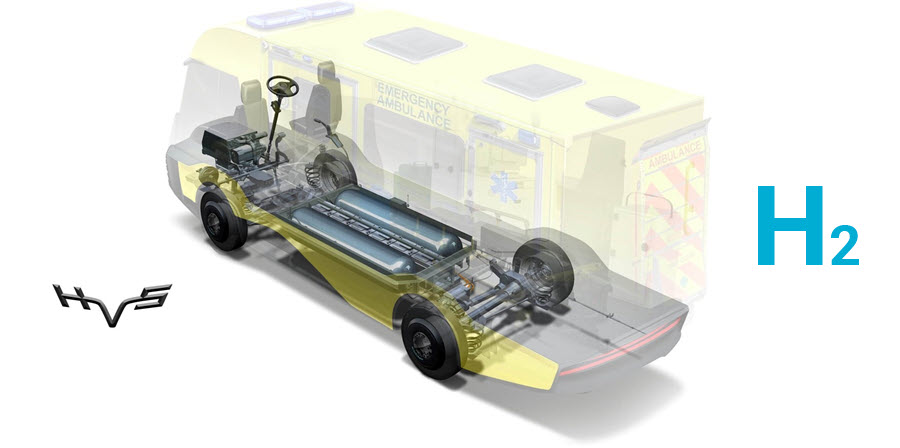
Scotland based Hydrogen Vehicle Systems (HVS) won an Innovate UK government grant of £460,000 from the Department for Transport. Supported by the grant, HVS is working with NHS Greater Glasgow and Clyde (NHS GGC), the Scottish Ambulance Service (SAS) and Foresight Innovations to develop the UK’s first purpose-built hydrogen-electric emergency ambulance.
The planned development will be completed by the end of March 2022 which aligns with the NHS GGC target of a net-zero fleet by 2025.
Although the development project of the zero-emission emergency ambulance is starting in Scotland, it has the potential to be released across the UK.
Unlike battery electric vehicles (BEV) that require downtime to charge, this hydrogen-electric ambulance can be refuelled in only 5 minutes. The quick refuelling will enable the ambulance to do back-to-back shifts which are a must-have for healthcare services. There are also opportunities for power off-take onboard, allowing medical equipment to be operated without producing emissions or having to run on a separate generator.
“This incredible win for HVS to develop a zero-emission emergency ambulance will help healthcare vehicles that need significant onboard power supplies for both transport and for static. The advantages of a hydrogen-electric powertrain that produces its own electricity onboard directly improves vehicle efficiency and reduces CO2 emissions. We also expect the Total Cost of Ownership (TCO) of hydrogen-electric vehicles to reach parity with petrol/diesel vehicles by 2030 if not sooner,” explained CEO Jawad Khursheed, HVS.
“The collaboration between NHS Greater Glasgow and Clyde, Scottish Ambulance Service and HVS, using a grant- funded project to develop a concept zero-emission hydrogen vehicle ambulance will prevent healthcare vehicles from contributing to air pollution and future associated respiratory diseases,” added, a spokesperson of the Scottish Ambulance Service.
The multi-award-winning HVS brings together the latest technology and their innovative designs to produce zero- emission commercial vehicles. HVS dual cell powertrain and chassis solutions will allow the wider transport industry to meet ambitious emission reduction targets of -15% by 2025, -30% by 2030 and fully zero-emission fleets by 2040.
About HV Systems
HV Systems design and develop zero-emission, long-range, hydrogen-powered commercial vehicles. With its Head Office based in Glasgow Scotland, HVS have a strategically positioned team across the country, including Coventry and other centres close to the wider automotive industry.
CEO of HVS, Jawad Khursheed took over leadership of HVS in early 2020. He has guided the company through the COVID-19 Pandemic and rebooted the vehicle development program. Since 2020 HVS has been granted a patent (a heat recapture system to increase drivetrain efficiency), successfully completed an Innovate UK funded feasibility study (SBRI Phase 1), built a comprehensive TCO model and projected emissions savings for vehicles, and brought van and truck development programmes to prototyping ready stage having built relationships with suppliers, industry partners and end- user/customers.
HVS believes in the moral and also commercial imperative to reduce carbon emissions to prevent the increasingly extreme impacts of climate change from escalating in the future. Battery power is far less effective in larger vehicles where maximising payload capacity is vital and logistics companies cannot afford the long downtime required to recharge. Hydrogen fuel cell vehicles are a logical solution with quick refuelling and performance parity with current diesel trucks possible.
Read the most up to date Fuel Cell and Hydrogen Industry news at FuelCellsWorks




